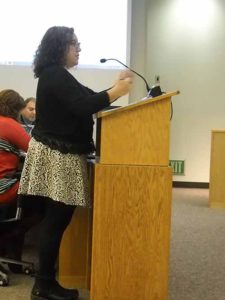UKIAH — Though we in Mendocino tend to focus on the strictly horticultural aspects of our green economy, there’s an ever expanding world of cannabis production and processing beyond the garden fence. Various extraction processes, distribution networks, transportation, tourism, and lab testing are just some of the new kinds of businesses that are popping up around weed. And both state law and common sense dictate that some kind of licensing, zoning, and planning arrangements be made for these nascent enterprises.

Attorney Hannah Nelson addresses the Committee during the public comment period.
So it was that at a General Government Standing Committee meeting on October 17, staff from the Mendocino County Planning and Building Department and the Mendocino County Executive Office provided recommendations for a draft ordinance concerning business licenses for medical cannabis businesses and zoning regulations for such facilities. The General Government Standing Committee consists of First District Supervisor Carre Brown and Fourth District Supervisor Dan Gjerde. Under the current plan, canna-business people could apply for permits by May, 2017, if the county’s medical cannabis business license ordinance and zoning regulations proceed according to a timeline laid out at a meeting on Monday.
The regulations under consideration would affect businesses hoping to dispense, distribute, process, test, manufacture and transport cannabis.*
In their presentation, Chief Planner Andy Gustavson and Analyst Sarah Dukett, of the County CEO’s office, laid out a proposal to provide a draft of the business license ordinance and zoning regulations to the full Board of Supervisors by February. Environmental review is scheduled for February and March, and the Planning Commission is then expected to hold a public hearing on the matter in March or April — after which there will be two hearings by the Supes. The County then hopes to allow for cannabis facility business license applications by May of 2017.
Recommendations for all the businesses under discussion included a 1,000 foot setback from any youth-oriented facility, schools, parks, or any church or residential treatment facility. Major or minor use permits, depending on the zone, were also recommended. Background checks were suggested, though uncertainty remains as to what kind of background should disqualify an applicant, given the changing legal environment.
Gjerde said that, while he has not heard any complaints about dispensaries in the county, he was concerned about the possibility of edibles in dispensaries being marketed to children.
Environmental Health Director David Jensen suggested the county look to other states, where medical and recreational cannabis have been legalized, but strict regulations require edibles to be packaged in such a way that they do not appeal expressly to the underage market.
During the public comment period, attorney Hannah Nelson said she had a number of clients who are interested in developing “bud and breakfasts,” a type of high-end agri-tourism similar to the luxury amenities connected to some wineries.
Brown, whose district is largely agricultural, agreed that the county has potential for agri-tourism, but pointed to conflicts that can arise with such commercial endeavours, which are often only accessible by roads that are maintained by neighborhood associations.
Brown and Gjerde are scheduled to give an update on the development of the licensing and zoning regulations to the whole board at the regularly scheduled Board of Supervisors meeting on October 18.
*A previous version of this article said that public comment would begin this week, since then the Board has changed the date. It is unclear when public comment will begin.
Sarah Reith 17 October 2016



